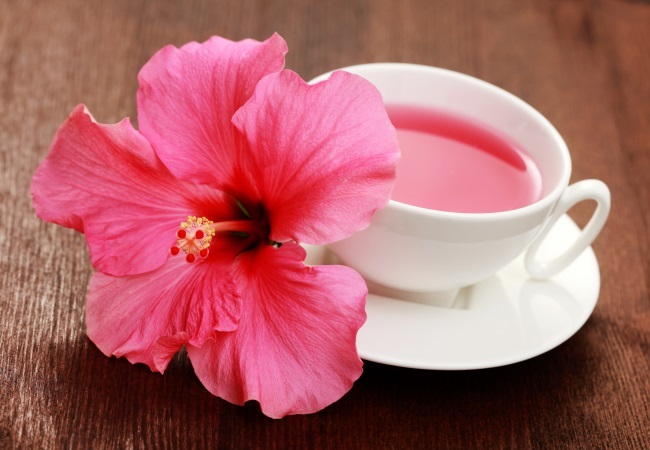Contributing Writer for Wake Up World
If you have traveled to Mexico then chances are that you’ve seen the vibrant, scarlet-hued herbal tea known as hibiscus. Commonly referred to as “sour drink” in Iran, hibiscus not only is a refreshingly tart brew but also has been used worldwide as an effective medicinal beverage. Rich in vitamin C, alkaloids and bioflavonoids, this bright-red elixir is traditionally used for supporting respiratory and cardiovascular health, lowering blood pressure, maintaining fluid balance and alleviating insomnia.
And now, contemporary research has validated the herb as a health-promoting tonic in a variety of areas.
[pro_ad_display_adzone id=”110028″]
Historical Uses, Modern Applications
Originally grown in Angola, the cultivation of Hibiscus sabdariffa has spread around the world to such subtropical regions as Sudan, China, Egypt, Mexico and Thailand.
“In Egypt and Sudan, hibiscus is used to help maintain a normal body temperature, support heart health, and encourage fluid balance. North Africans have used hibiscus internally for supporting upper respiratory health including the throat throat and also use it topically to support skin health. In Europe, hibiscus has been employed to support upper respiratory health, alleviate occasional constipation, and promote proper circulation. It is commonly used in combination with lemon balm and St John’s Wort for restlessness and occasional difficulty falling asleep”, states Naturopathic Doctor Tori Hudson.
Presently, studies on hibiscus have shown it to be beneficial for reducing cadmium toxicity [1], easing Parkinson’s disease [2] and lowering blood pressure. [3][4][5]
Moreover, research has indicated a positive connection between hibiscus consumption and managing metabolic syndrome, as well as maintaining healthy cholesterol levels. Dr. Hudson notes:
“Hibiscus extract was also studied in 222 patients — some with and some without metabolic syndrome (MS). A total daily dose of 100 mg H. sabdariffa extract powder (HSEP) was given for 1 month to men and women, 150 without MS and 72 with MS. Participants were randomly assigned to a preventive diet, HSEP treatment or diet combined with HSEP treatment.
“The MS patients receiving HSEP had significantly reduced glucose, total cholesterol and LDLc and increased HDLc. A triglyceride lowering effect was seen in all groups but was only significant in the control group that was treated with diet. The triglyceride/HDL-c ratio was also significantly reduced with HSEP in the control and MS groups, indicating an improvement in insulin resistance.
“It has been hypothesized that the anthocyanins regulate adipocyte function, which has important implications for both preventing and treating metabolic syndrome”, says Dr. Hudson.
Article Sources:
- Influence of aqueous extract of Hibiscus sabdariffa L. petal on cadmium toxicity in rats., Asagba, S O;Adaikpoh, M A;Kadiri, H;Obi, F O, Biological trace element research, 2007. Retrieved on November 29, 2013, from: http://science.naturalnews.com
- Methanolic extract of Hibiscus asper leaves improves spatial memory deficits in the 6 hydroxydopamine lesion rodent model of Parkinson’s disease. Foyet, Harquin Simplice;Hritcu, Lucian;Ciobica, Alin;Stefan, Marius;Kamtchouing, Pierre;Cojocaru, Dumitru, Publication: Journal of ethnopharmacology, 2011. Retrieved on November 29, 2013, from: http://science.naturalnews.com
- Hibiscus sabdariffa L. tea (tisane) lowers blood pressure in prehypertensive and mildly hypertensive adults, McKay, Diane L;Chen, C-Y Oliver;Saltzman, Edward;Blumberg, Jeffrey B, The Journal of nutrition, 2010. Retrieved on November 29, 2013, from: http://science.naturalnews.com
- The effects of sour tea (Hibiscus sabdariffa) on hypertension in patients with type II diabetes, H Mozaffari-Khosravi1, B-A Jalali-Khanabadi2, M Afkhami-Ardekani3, F Fatehi3 and M Noori-Shadkam4, Journal of Human Hypertension, 2008. Retrieved on November 29, 2013, from: http://www.nature.com
- Clinical effects produced by a standardized herbal medicinal product of Hibiscus sabdariffa on patients with hypertension. A randomized, double-blind, lisinopril-controlled clinical trial, Herrera-Arellano A, Miranda-Sanchez J, Avila-Castro P, Herrera-Alvarez S, Jimenez-Ferrer JE, Zamilpa A, Roman-Ramos R, Ponce-Monter H, Tortoriello J. Planta Med. 2007 Jan;73(1):6-12. Retrieved on November 29, 2013, from: http://www.ncbi.nlm.nih.gov
Additional Sources:
Previous articles by Carolanne:
- Dry Skin Brushing Can Strengthen Immunity, Spark Detoxification and Reverse Aging
- Cannabis Dissolves Cancerous Tumor in Young Infant, Deemed ‘Miracle Baby’ by Physician
- Vitamin C for Taming Tension, Burning Fat, and Much More
- Fulvic Acid: The Amazing Health Secret You’ve Never Heard About
- Is Mold Making You Sick?
- Hemp – The Ultimate Cash Crop, Health Food and Environmental Savior Rolled Into One
- Slash your Organic Food Bill by Almost 90 Percent with This One Simple Method
- Chemtrails: Learn How to Protect Yourself From These Treacherous Poisons
- Autistic Boy with Higher IQ Than Einstein Discovers Gift After Removal from State-Run Therapy
- Enhance Spiritual, Mental and Physical Well-being with a Pineal Gland Detox
- Enterprising Community Aims for Total Food Self-Sufficiency with Free Edible Landscapes
- The Silent Toxin in Food that Provokes Cancer, Diabetes, Multiple Sclerosis and More
- DIY $2 Self-Watering Garden Bed – Grow Produce Easily, Even in the Toughest Conditions
[pro_ad_display_adzone id=”110025″]
Please note: this article by Carolanne Wright first appeared on Natural News.
[pro_ad_display_adzone id=”110027″]







